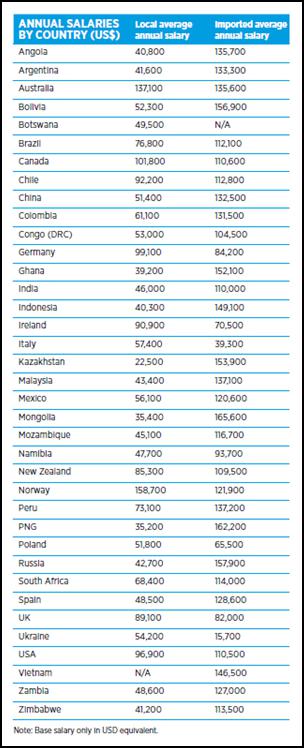NZ 9th in worldwide resources and mining salary ranking
PRESS RELEASE
Tuesday August 13th
2013
New Zealand 9th in worldwide resources and
mining salary ranking
New Zealand’s local
resources & mining professionals earn the 9th highest wage
globally, according to a worldwide study of remuneration
trends published by recruiting experts Hays Resources &
Mining.
The 2013 Hays Resources & Mining Global Salary Guide, which will be officially launched at Australia’s Diggers & Dealers conference on 5th August, is based on a survey of over 10,000 people working in 37 countries in 18 discipline areas as well as the databases of both Hays Resources & Mining and Infomine. Over a quarter of a million separate pieces of data were collected in total. This is the first time such a comprehensive worldwide study of remuneration trends in the resources industry has been conducted.
Making up the top five annual local average base salaries are Norway ($158,700), Australia ($137,100), Canada ($101,800), Germany ($99,100) and the USA ($96,900) (all salaries in USD equivalent). New Zealand’s annual local average base salary is $85,300.
Making up the top five annual imported average base salaries are Mongolia ($165,600), Papua New Guinea ($162,200), Russia ($157,900), Bolivia ($156,900) and Kazakhstan ($153,900), with many others also paying above $100,000. New Zealand’s annual imported average base salary is $109,500.
A table with the full list of average permanent base salaries by country is below (see page 3).
Hays Resources & Mining listed local and imported salaries separately since the two can vary enormously. “Local salaries are far more indicative of the local environment, pay scales, domestic economies and investment in the local resources industry,” says Simon Winfield, Senior Regional Director of Hays Resources & Mining.
“Imported salaries are more reflective of the global industry and are a mix of expatriate professionals and a smaller portion of imported cheaper labour. As a result they are usually higher than the local equivalent, particularly when a country needs to use salary to offset perceived low standards of living, difficult environments or security concerns to attract foreign professionals.”
Of the six countries importing skills at a lower cost than local labour, five of them are in Europe and the sixth is Australia. According to the Guide, this phenomenon in the European countries reflects in the most part the free movement of labour allowed within the European Union. The other two - Norway (outside of the European Union) and Australia both sit at the top of the league table for local salaries and consequently anyone coming from other nations will by definition come from a lower paying country.
“The past year has been an eventful one for the resources and mining industry as we work through the cycle of a downturn in commodity prices and the subsequent recovery,” says Simon.
“This cycle is the ultimate driver for staffing levels, but not all geographical regions were affected in the same way; the world is a patchwork of the wealthy and not so wealthy and remuneration is consequently enormously diverse and reflective of each country’s local economy, skills shortages and the nature and type of operations that exist.
“While the mature markets of Australia, Canada and to some extent Brazil are feeling the full force of the decline in demand, the emerging markets in Africa are capitalising on those seeking higher margins and a better potential return at lower product prices. The obvious impediment to these investment dollars come in the form of security issues.
“Inextricably linked with levels of security is the political back drop in each country and region, and this also impacts on how each country fares in being able to attract investment.”
For your copy of the 2013 Hays Resources & Mining Global Salary Guide please contact your local Hays Resources & Mining office after 5th August or visit www.hays.net.nz.
Hays, the world’s leading recruiting experts in qualified, professional and skilled people.

- Ends -
About Hays
Hays is the leading
global specialist recruiting group. We are the expert at
recruiting qualified, professional and skilled people
worldwide, being the market leader in Asia Pacific and the
UK and one of the market leaders in Continental Europe and
Latin America. We operate across the private and public
sectors, dealing in permanent positions, contract roles and
temporary assignments.
Hays employs 7,800 staff operating from 245 offices in 33 countries across 20 specialisms. For the year ended 30 June 2012, Hays reported net fees of £734 million and operating profit (pre-exceptional items) of £128 million. Hays placed around 55,000 candidates into permanent jobs and around 182,000 people into temporary assignments. 33% of Group net fees were generated in Asia Pacific.
Hays operates in the following countries: Australia, Austria, Belgium, Brazil, Canada, Colombia, Chile, China, the Czech Republic, Denmark, France, Germany, Hong Kong, Hungary, India, Ireland, Italy, Japan, Luxembourg, Malaysia, Mexico, the Netherlands, New Zealand, Poland, Portugal, Russia, Singapore, Spain, Sweden, Switzerland, UAE, the UK and the USA.


 University of Auckland: Protecting Young Minds With AI
University of Auckland: Protecting Young Minds With AI Greenpeace: Greenpeace Calls On Fonterra Investors To Consider Big Picture With Giant Puzzle
Greenpeace: Greenpeace Calls On Fonterra Investors To Consider Big Picture With Giant Puzzle Hugh Grant: How New Tech Helps Kids Love Soccer More
Hugh Grant: How New Tech Helps Kids Love Soccer More Bill Bennett: Download Weekly - 100% claim lands One New Zealand in criminal court action
Bill Bennett: Download Weekly - 100% claim lands One New Zealand in criminal court action FSCL: Woman Scammed Out Of $25,000 After Job Offer On LinkedIn
FSCL: Woman Scammed Out Of $25,000 After Job Offer On LinkedIn NIWA: Cheers To Crustaceans - New Species Named After Welly Brewery
NIWA: Cheers To Crustaceans - New Species Named After Welly Brewery



